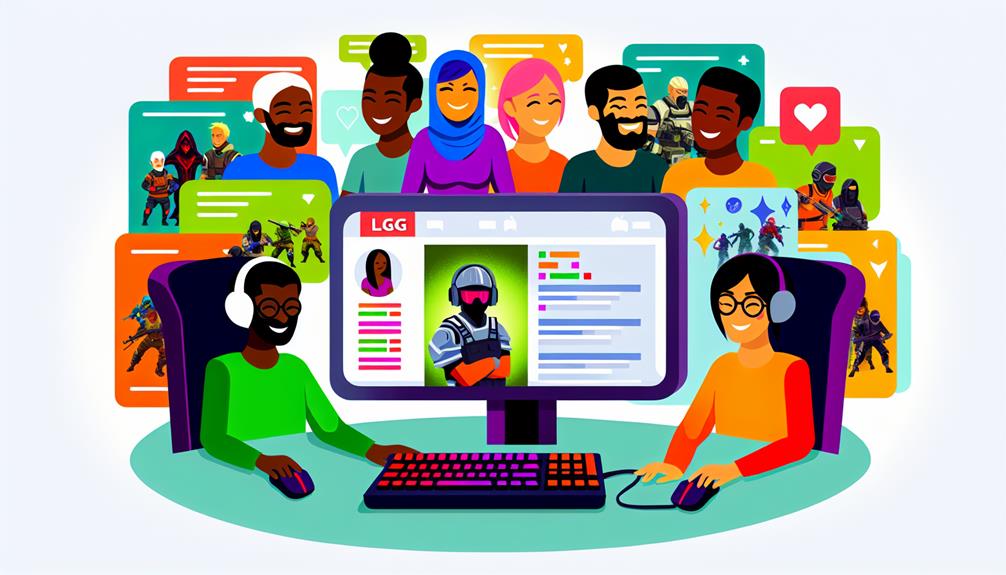"LFG," meaning "Looking For Group," is a term essential in online communities, particularly gaming. It indicates a player's desire to connect with others for shared gameplay experiences. These messages help assemble teams for various activities, from raids to casual sessions, fostering collaboration and camaraderie. LFG promotes inclusivity, allowing newcomers to find their place within the community. Its usage has expanded beyond gaming, appearing in various social platforms for activities like fitness and hobbies. Understanding the nuances and etiquette of LFG can greatly enhance community engagement and interactions. Discover how this term enriches connections and experiences within diverse online environments.
Key Takeaways
- "LFG" stands for "Looking For Group," facilitating collaboration among gamers to form parties for various activities and enhancing social interactions.
- It encourages inclusivity and community by allowing players to connect based on shared goals, interests, and experiences in gaming and beyond.
- Effective LFG usage includes clear communication about specific goals, availability, game experience, and desired roles to foster engagement and trust.
- LFG has expanded beyond gaming into social media, helping individuals find connections for diverse activities like fitness, hobbies, and community events.
- Misconceptions about LFG often limit participation, as it supports both competitive and casual play, welcoming newcomers and fostering a sense of belonging.
Definition of LFG

The acronym "LFG" stands for "Looking For Group," a term commonly used in online gaming and community forums. This phrase signifies a player's desire to connect with others for collaborative gameplay, fostering a sense of belonging within the community. Similar to other abbreviations like "FR" and "FRFR," which express agreement or emphasis, understanding LFG terminology is essential for effective communication among players, as it encompasses various abbreviations and phrases that streamline group formation. Adhering to LFG etiquette is equally important; it encourages respectful interactions and helps maintain a positive atmosphere for all participants. By clearly stating one's goals and being considerate of others' preferences, players can enhance their experiences and forge meaningful connections. Embracing LFG in this manner not only enriches gameplay but also cultivates lasting friendships within the gaming community.
LFG in Gaming Communities
In gaming communities, "LFG" signifies a call for players seeking groups to engage in cooperative gameplay or complete specific objectives. This form of communication mirrors the flexibility seen in remote work environments, where collaboration is essential for success the pros and cons of remote jobs. Common scenarios for its usage include forming parties for raids, quests, or competitive matches, fostering collaboration among participants. Understanding the impact of LFG on group dynamics is essential, as it not only encourages social interaction but also shapes the overall gaming experience.
Meaning of LFG
Within gaming communities, "LFG" stands as an important acronym, signifying "Looking For Group." This term is widely utilized by players seeking to join others for cooperative gameplay, whether it be for completing quests, tackling challenges, or engaging in competitive matches. The rise of LFG has fostered a sense of belonging among gamers, allowing them to connect with like-minded individuals. However, understanding LFG etiquette is vital to guarantee respectful and effective communication. Players should be clear about their intentions and expectations when posting LFG requests. Additionally, there are various LFG alternatives, including dedicated platforms and in-game tools, that facilitate group formation. These options can enhance the gaming experience and help forge lasting friendships within the community.
Common Usage Scenarios
Numerous scenarios illustrate the practical application of "LFG" in gaming communities, highlighting its significance in enhancing player interactions. These interactions often foster a sense of belonging, as players connect over shared gaming experiences.
Here are three common usage scenarios:
- Raiding Parties: Gamers frequently post LFG messages to form groups for challenging raid encounters, ensuring success through collaboration.
- Casual Play: Players seeking casual gaming sessions use LFG to find others who share their interests, enhancing social engagement.
- Event Participation: Many use LFG to join community events, resulting in memorable experiences and friendships.
To maximize these interactions, players should follow LFG etiquette tips and share their LFG success stories, creating an inclusive atmosphere that encourages ongoing participation.
Impact on Group Dynamics
LFG messages play an essential role in shaping group dynamics within gaming communities. By facilitating connections among players, these messages foster team cohesion and encourage collaboration. The diverse communication styles inherent in LFG interactions allow individuals to express their needs and preferences, creating a welcoming environment for newcomers seeking companionship. As players engage through LFG platforms, they develop a sense of belonging, which enhances their gaming experience. This engagement not only promotes the formation of teams but also strengthens existing relationships, contributing to a vibrant community culture. Ultimately, LFG messages serve as a catalyst for meaningful interactions, reinforcing the importance of teamwork and mutual support in gaming environments. Through effective communication, players can cultivate friendships that extend beyond the virtual domain.
LFG Beyond Gaming

The term "LFG" originated within gaming circles, but its application has expanded greatly across various online platforms. Social media has played an essential role in this evolution, enabling users to seek connections for diverse activities beyond gaming, such as fitness groups or hobby clubs. For instance, many users are looking to refresh their social lives with new activities, similar to how one might refresh their wardrobe with fresh spring outfit ideas. By examining community engagement examples, we can better understand how "LFG" facilitates social interactions in a broader context.
Origin of "LFG"
In the domain of online communication, the abbreviation "LFG" has evolved considerably beyond its gaming origins. Initially used to rally players for quests, its transformation reflects a deeper human need for connection. The LFG history shows how gaming terms can transcend digital boundaries, fostering community and camaraderie.
This evolution highlights three key emotional aspects:
- Belonging: LFG invites individuals to join together, creating a sense of community.
- Excitement: The call to action sparks enthusiasm and anticipation for shared experiences.
- Support: LFG fosters an environment where people seek help and companionship.
As LFG continues to adapt, it symbolizes our innate desire to connect, reinforcing the importance of community in various spaces.
Social Media Impact
A substantial shift has occurred as "LFG" transcends its gaming roots, infiltrating social media platforms and transforming how individuals connect. This evolution reflects current social media trends, where the phrase now serves as a rallying cry for those seeking companionship and shared experiences beyond gaming. Users leverage "LFG" to express their desire for community, whether in fitness groups, book clubs, or event planning. Consequently, "LFG" enhances online communication by fostering inclusivity and encouraging collaborative interactions. As individuals navigate the complexities of modern life, the use of "LFG" symbolizes a collective yearning for belonging, allowing people to forge connections and engage meaningfully within diverse interests. This trend highlights the importance of community in an increasingly digital age.
Community Engagement Examples
Leveraging "LFG" in various contexts demonstrates its versatility beyond the gaming sphere, showcasing how communities engage in meaningful interactions across diverse interests. Here are three poignant examples of "LFG" fostering connection:
- Community Challenges: Groups unite to tackle social issues, such as climate action or local volunteering, creating a sense of shared purpose and collective impact.
- Event Organization: From art exhibitions to charity runs, individuals use "LFG" to gather support and mobilize efforts, transforming ideas into reality.
- Hobby Collaborations: Craft groups or book clubs utilize "LFG" to find like-minded individuals, enhancing personal growth and camaraderie.
These instances reveal that "LFG" transcends gaming, nurturing a sense of belonging and active participation in various community initiatives.
How to Use LFG Effectively
Effectively utilizing the term "LFG" (Looking for Group) can greatly enhance your experience in online communities, particularly in gaming and collaborative platforms. To maximize your reach, communicate your intentions clearly and specify what you seek in a group. This fosters inclusivity and encourages others to join.
| What to Include | Why It Matters | How It Helps |
|---|---|---|
| Specific Goals | Builds trust | Attracts like-minded players |
| Time Availability | Shows respect | Facilitates scheduling |
| Game Experience | Encourages bonding | Creates a sense of belonging |
Importance of LFG in Collaboration

The role of LFG (Looking for Group) extends beyond gaming, considerably impacting collaborative efforts across various online platforms. By fostering connections among individuals seeking to achieve shared objectives, LFG contributes to enhancing team synergy and streamlining the pursuit of collaborative goals. Recently, P. Diddy has been involved in various projects that exemplify the power of collaboration in the entertainment industry, showcasing how LFG can also apply to creative partnerships recent collaborations in entertainment.
Here are three key benefits of LFG in collaboration:
- Connection: Facilitates meaningful interactions, helping individuals find like-minded peers.
- Diversity: Encourages participation from varied backgrounds, enriching team dynamics and perspectives.
- Achievement: Aligns efforts towards common goals, promoting a sense of belonging and accomplishment.
Embracing the LFG culture can create an inclusive environment where everyone feels empowered to contribute, ultimately strengthening the collaborative spirit within online communities.
Common Misconceptions About LFG
Many individuals hold misconceptions about LFG (Looking for Group) that can hinder its effective use in fostering collaboration. One common misinterpretation issue is that LFG is solely for competitive gamers, whereas it actually serves a broad range of interests, including casual play and social interaction. To illustrate this, creating engaging activities like crossword puzzles in Excel can be a fun way to bring groups together and enhance social connections. Additionally, cultural differences can lead to misunderstandings about the tone and intent behind LFG posts, causing some to perceive them as exclusionary rather than welcoming. Moreover, some believe that LFG is only for established groups, neglecting the potential for newcomers to initiate connections. By addressing these misconceptions, communities can create a more inclusive environment, allowing members to feel valued and engaged in collaborative experiences. Embracing LFG can enhance belonging and unity within diverse online spaces.
Frequently Asked Questions
What Does LFG Stand for in Different Contexts?
The acronym "LFG" holds significance across various contexts, primarily denoting "Looking For Group" in gaming and social platforms. This usage reflects a desire for community engagement and collaboration. Additionally, LFG variations may include interpretations such as "Let's F***ing Go," often used to convey enthusiasm or motivation. Each variant serves to foster belonging and connection, illustrating the diverse ways individuals express their intent and camaraderie within different social spheres.
Can LFG Be Used in Non-Gaming Social Events?
Yes, "LFG" can indeed be utilized in non-gaming social events. In the context of social gatherings and event planning, it serves as a rallying call for individuals seeking companionship or group participation. By using "LFG," organizers can foster a sense of belonging, encouraging attendees to connect with others who share similar interests. This modern acronym effectively bridges gaps, promoting engagement and collaboration in various social settings beyond traditional gaming environments.
Are There Any Alternative Phrases to LFG?
When seeking alternatives to "LFG," several synonyms can effectively convey a similar spirit of enthusiasm and invitation. Phrases such as "who's in?" or "let's go!" can serve as engaging LFG alternatives in various contexts. Additionally, expressions like "join me" or "looking for partners" can foster a sense of belonging and inclusivity, encouraging participation in both gaming and non-gaming events. Utilizing these LFG synonyms can enhance community interaction and connection.
How Did the Term LFG Originate?
The term "LFG," an acronym for "Looking For Group," originated within gaming slang to facilitate social interactions among players seeking teammates for collaborative gameplay. Emerging from the early days of multiplayer online games, this phrase quickly gained traction in internet culture, reflecting a growing demand for community and cooperation. Its widespread adoption illustrates the desire for connection and belonging among gamers, fostering a sense of camaraderie in digital environments.
Is LFG Considered Informal Language?
Yes, "LFG" is indeed considered informal language, primarily associated with casual communication and internet slang. It is commonly used in various online environments, particularly within gaming and social platforms, to express a desire for participation or collaboration. While its usage fosters a sense of belonging among users, it may not be suitable for formal contexts. Understanding such terminology can enhance engagement in digital communities where informal expressions are prevalent.



